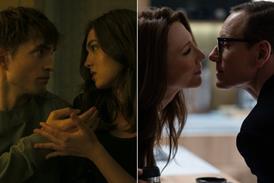Dir: Garry Marshall. US.2001. 115 mins.
Shot on the same soundstage that was used for Mary Poppins, the Disney comedy that catapulted Julie Andrews to international stardom, The Princess Diaries is an enjoyable fairy tale that in its mores andmessage is not that different from that Andrews' 1964 Oscar-winning picture. This time around, the very graceful Andrews stars as a European Queen, endowed with the task of transforming her shy and awkward granddaughter, who's unaware of her blue blood, into a real-life princess. Representing the same kind of light fare as director Gary Marshall's other work, this new comedy is evensofter and more old-fashioned than his commercial hits, Pretty Woman or Runaway Bride. Though marketed as an all-family fare, The Princess Diaries is mostly targeted at young, impressionable girls, who are likely to be swept away by the bubbly romantic feel of a movie that every once in while strenuously acknowledges its more "realistic" locale, contemporary San Francisco. The picture's merits- the feel-good nature, happy ending, and a terrific debut by AnneHathaway (from US television's Get Real), should make this G-rated wish fulfillment, female empowerment fairy tale a box-office hit in the US.
The heroine of Meg Cabot's originalyoung-adult novel is a timid 15-year old San Franciscan, Mia Thermopolis(Hathaway), who is thrown for a loop when she learns of her being the heirapparent to the crown of Genovia, a tiny European kingdom (not unlike Monaco,and its late actress-princess, Grace Kelly). Though raised by her singlemother, Helen (Goodall), a free-spirited artist-bohemian, Mia is summoned tomeet her formidable grandmother, Queen Clarisse Renaldi (Andrews), who informsher that she's about to begin a series of "princess lessons" underher strict supervision.
The two women, who couldn'thave been more different, clash instantly. Initially, Mia has no intention ofdropping her normal life to become the ruler of a far-off, obscure country. Atthe same time, Clarisse insists that this not a matter of choice; it's herduty. Just as stubbornly minded as her granddaughter, Clarisse is determined todo a complete makeover of Mia, a sparkling-diamond-in-the-rough, so that shecan assume her rightful royal position.
Most of the narrativedepicts how Mia's former social life is turned upside-down. Her toughestdecision is whether to remain with her loving mom, or leave everything behindand accept royal responsibilities. In the midst of a series of crises, Miaexclaims, "I don't want to run my own country, I just want to pass tenthgrade!"
Recalling Pygmalion (and, of course, its musical and film version, MyFair Lady), and countless other"ugly ducklings-turned-charming ladies" sagas, Princess Diaries is structured as a comic journey, in which a girl wholacks manners is introduced into the ways of upper-class etiquette. Mia -- andthe audience -- goes through the requisite motions of how to walk and talk likea lady, eat with finesse, dress more suavely, dance gracefully, and so on.
Pandering to older viewers,the film also contains intimations of latent romantic yearnings betweenClarisse and Joseph (Elizondo), her head of security, assigned to escort andprotect Mia. Older viewers may even shed a tear in the scene, in which theclumsy Mia learns how to gracefully glide across the floor while followingJoseph's lead. After Mia leaves the room, Joseph beckons Clarisse to join himin a dance. Elizondo, and particularly Andrews, are so naturally elegant, thateven when they're hamming it up, as they do here, they're still charming.
At first, Mia's schoolfriends are upset by her sudden notoriety and subsequent transformation. Herbest friend, Lily Moscovitz (Matarazzo), a bright Jewish brat who runs a localradio show that propagates environmental and political activism, is not onlyhorrified by Mia's overnight fame but is also fearful of losing their intimatebond. Additional tension is provided by Mia's nemesis, Lana (recording artistMandy Moore), as the school's most popular and glamorous girl.
Ultimately, the moststriking element of Princess Diaries is its centrist ideology, the way it compromises seemingly divergentvalues: royalty vs. working-class, blue-blood privileges vs. more normalgrowing pains. The whole narrative is based on a series of dichotomies, notjust of values, but also of girlfriends and boyfriends. Hence, in the loveinterest stakes, Mia is placed between two different boys, ending up with theone who's outside her milieu - again indicating the film's reconciliatorynature.
As always, Marshall'sphilosophy is that a movie should have "something" for everyone. Withthe notable exception of his adult fare, the disastrous wannabe kinky comedy, ExitEden, he has been (re)making thesame kind of story; it may be the only thing that Marshall, an old TV pro, iscapable of doing. In this movie, he's still polarizing good and bad, rich andpoor, in the same simplistic way he had done in Flamingo Kid, his second outing, back in 1984.
Immeasurably contributing tothe film's overall success is the star-quality performance by screen neophyteHathaway, who's equally adept at a goofy physical comedy and more seriousromantic melodrama. The beautiful Hathaway is someone to watch: With the rightchoice of roles, she could become a much sought-after Hollywood leadingactress.
Prod co: Walt Disney Pictures Presentation
US dist: Buena Vista
Int'l dist: Buena VistaInt'l
Prods: Whitney Houston,Debra Martin Chase, Mario Iscovich
Scr: Gina Wendkos, basedon the novel by Meg Cabot
DoP: Karl Walter Lindenlaub
Prod des: Mayne Berke
Ed: Bruce Green
Music: John Debney
Main cast: Julie Andrew,Anne Hathaway, Hector Elizondo, Heather Matarazzo, Caroline Goodall, MandyMoore, Robert Schwartzman


















No comments yet